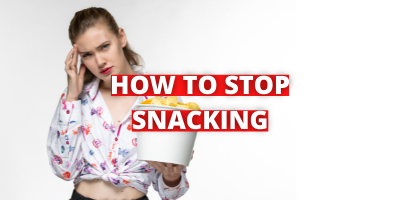5 Simple Tips To Stop Snacking Today!
Many of us struggle with snacking throughout the day, in between meals and especially at night.
It’s hard to stop snacking.
Most of us enjoy eating delicious food and do not keep our portions in check. This can lead to mindless snacking and eventually cause weight gain.
If this is a problem you face, then keep reading as we discuss 5 tips on how to stop snacking!
-
Eat proper meals
 Food photo created by jcomp – www.freepik.com“>
Food photo created by jcomp – www.freepik.com“>
It is extremely important to make sure you eat proper meals at regular periods. Try eating proper healthy meals three times a day which meet your nutritional demands. This will reduce your cravings for snacks in between meals.
A good tip is to try eating foods high in proteins such as chicken, fish, or eggs. These foods take longer to digest and will therefore keep you satisfied for a longer amount of time.
-
Do not stress eat!
 Woman photo created by cookie_studio – www.freepik.com “>
Woman photo created by cookie_studio – www.freepik.com “>
In 2019/20 55% of working days lost were due to stress!
It is important to recognize when you are stressed. Many of us eat food just for comfort as we feel that eating helps soothe us in stressful situations.
Stress eating should be avoided because it forces many of us to snack impulsively.
It is important to remember that stress eating will not actually solve anything and may create more problems in the future such as weight gain.
If you struggle to cope with stress and are snacking uncontrollably, it is time to learn how to identify when you are stressed and how to manage it.
Stress is not what happens to you, stress is how you think and feel about what happens to you. We provide many other useful tips in our “Coping with stress” wellbeing webinar.
-
Drink more water
 Food photo created by Racool_studio – www.freepik.com“>
Food photo created by Racool_studio – www.freepik.com“>
When you feel hungry and are convinced you must increase your food consumption, you could be wrong. Did you know that symptoms of dehydration can often be mistaken for hunger?
It is therefore crucial to pay attention to your water intake to ensure you do not feel the need to snack when in fact all you need to do is drink more water.
It can be beneficial to set several reminders on your phone throughout the day to drink more water to replace snacking. To find out more about the importance of drinking water and staying hydrated click here!
-
Choose healthy food options
 Food photo created by drobotdean – www.freepik.com“>
Food photo created by drobotdean – www.freepik.com“>
Try replacing your unhealthy snacks with fruits and vegetables.
When shopping for food, avoid bringing tempting snacks home. Instead, stock your pantry with healthy snacking options. So, when you feel like you need a snack at least you will have plenty of nutritious alternatives.
A good tip is to wash and chop your fruits and veggies before putting them in your fridge. This will make it easy for you to grab a healthy snack without the hassle of having to cut them up!
-
Eat without distractions
 Food photo created by shurkin_son – www.freepik.com“>
Food photo created by shurkin_son – www.freepik.com“>
Lastly, although it is tempting and relaxing to eat your meals while scrolling through your phone or watching TV, this is a bad idea which can cause mindless snacking. It is important to not divert your attention away from your food.
How fast can you finish a bucket of popcorn without even noticing while watching a movie? Or that big bag of crisps you gobbled while working at your desk.
It is a good idea to set aside time, at least 5 minutes to stop what you are doing and eat your meals, including snacks without distractions. This way you can concentrate on and fully enjoy your food.
Trying to lose weight?

Managing your unhealthy snacking habits will definitely aid in your goal to lose weight. However, it is not enough.
Even though you are reducing your food intake during the day, it is crucial to pay attention to what you are eating for your meals.
Follow the suggestions below for a nutritious and satisfying meal planner.
Try starting your day off with some wholegrains, lean protein such as eggs, low-fat dairy such as lower sugar yoghurts and fruits and vegetables.
It is a good idea to plan your lunch the day before for it not to be an afterthought. What you eat midday can make a big difference to how you feel all afternoon. A salad is always a good idea. With almost endless flavour combinations you can always mix it up.
When it comes to making a healthy dinner, it’s all about balance. An ideal dinner features vegetables, protein such as chicken or salmon; grains such as brown rice or quinoa; and healthy fats such as cooking your vegetables in extra virgin olive oil.
Do not stress if you find that you’re still mindlessly snacking sometimes. The goal is to slowly work on yourself. With a strong, long-term commitment, you will see your old habits gradually transform and eventually stop snacking throughout your day!
Good luck!

